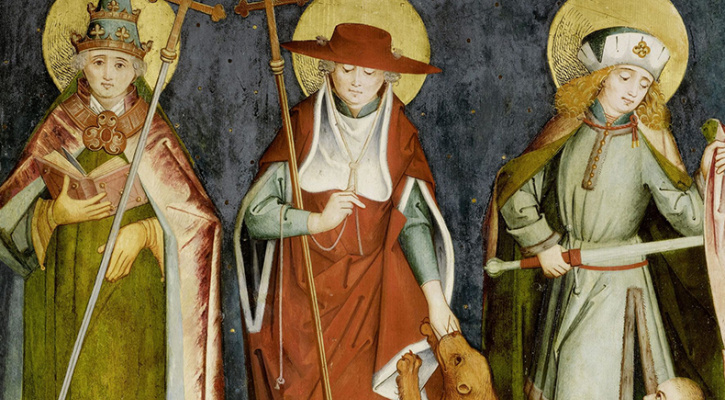Saint of the Day for September 30: Saint Jerome

Bishop Schneider: Pope Francis Has Contradicted ‘The Entire Gospel’, by Michael Haynes
September 28, 2024
‘Neo-Conned!’: Catholic Military Expert Exposes the Unjust Agenda in the Middle East, by Maike Hickson
September 30, 2024
Image: One side of a double-sided panel. Three saints in full figure – Saint Sylvester, Saint Jerome, and Saint Martin | anonymous
Franciscan Media, Sep 30, 2020
Saint Jerome’s Story – (345 – 420)
Most of the saints are remembered for some outstanding virtue or devotion which they practiced, but Jerome is frequently remembered for his bad temper! It is true that he had a very bad temper and could use a vitriolic pen, but his love for God and his son Jesus Christ was extraordinarily intense; anyone who taught error was an enemy of God and truth, and Saint Jerome went after him or her with his mighty and sometimes sarcastic pen.
He was above all a Scripture scholar, translating most of the Old Testament from the Hebrew. Jerome also wrote commentaries which are a great source of scriptural inspiration for us today. He was an avid student, a thorough scholar, a prodigious letter-writer and a consultant to monk, bishop, and pope. Saint Augustine said of him, “What Jerome is ignorant of, no mortal has ever known.”
Saint Jerome is particularly important for having made a translation of the Bible which came to be called the Vulgate. It is not the most critical edition of the Bible, but its acceptance by the Church was fortunate. As a modern scholar says, “No man before Jerome or among his contemporaries and very few men for many centuries afterwards were so well qualified to do the work.” The Council of Trent called for a new and corrected edition of the Vulgate, and declared it the authentic text to be used in the Church.
In order to be able to do such work, Jerome prepared himself well. He was a master of Latin, Greek, Hebrew, and Chaldaic. He began his studies at his birthplace, Stridon in Dalmatia. After his preliminary education, he went to Rome, the center of learning at that time, and thence to Trier, Germany, where the scholar was very much in evidence. He spent several years in each place, always trying to find the very best teachers. He once served as private secretary to Pope Damasus.
After these preparatory studies, he traveled extensively in Palestine, marking each spot of Christ’s life with an outpouring of devotion. Mystic that he was, he spent five years in the desert of Chalcis so that he might give himself up to prayer, penance, and study. Finally, he settled in Bethlehem, where he lived in the cave believed to have been the birthplace of Christ. Jerome died in Bethlehem, and the remains of his body now lie buried in the Basilica of St. Mary Major in Rome.
Reflection
Jerome was a strong, outspoken man. He had the virtues and the unpleasant fruits of being a fearless critic and all the usual moral problems of a man. He was, as someone has said, no admirer of moderation whether in virtue or against evil. He was swift to anger, but also swift to feel remorse, even more severe on his own shortcomings than on those of others. A pope is said to have remarked, on seeing a picture of Jerome striking his breast with a stone, “You do well to carry that stone, for without it the Church would never have canonized you” (Butler’s Lives of the Saints).
Saint Jerome is the Patron Saint of:
Librarians
Scholars
Translators
https://www.franciscanmedia.org/saint-of-the-day/saint-jerome/




